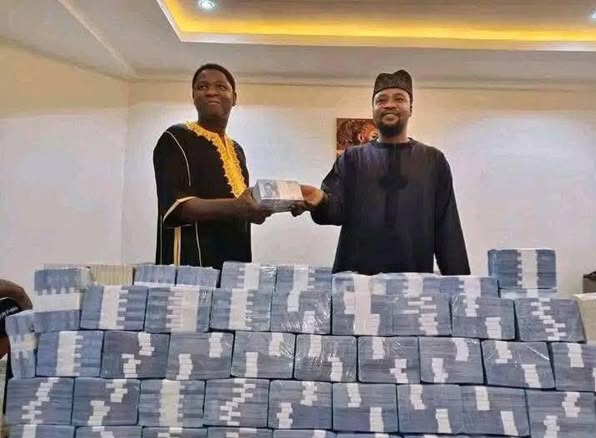In a development that has set social media buzzing, Hon. Jafar Abubakar, a member of Nigeria’s House of Representatives representing Mubi North, Mubi South, and Maiha Federal Constituency of Adamawa State, has reportedly distributed a whopping ₦224 million in cash within his constituency.
According to reports, ₦124 million was allocated to “empower” hundreds of youths, while ₦100 million went to his boyhood friends, whom he described as struggling financially. The funds, allegedly withdrawn in mint notes from a commercial bank, were shared directly with beneficiaries.
This move has triggered widespread criticism, with many Nigerians questioning the source of the funds and the culture of reckless political spending it represents.
One Facebook user, Daniel Pablo, expressed frustration, writing:
“This is why Nigeria can never work.”
Another user, King Mathew, pointed fingers at the nation’s anti-graft agency, saying:
“This is the time for EFCC to show workings, but no—they’re waiting for yahoo boys with laptops and iPhones. Nonsense.”
The Bigger Picture: Nigeria’s Political Spending Culture
This is not an isolated incident. Earlier in May, another federal lawmaker revealed shocking details about the enormous amounts allocated to legislators under the guise of “constituency projects.”
According to his disclosure, no senator in Nigeria received less than ₦2 billion, while House of Representatives members pocketed at least ₦1 billion each. These revelations came after the removal of fuel subsidy by President Bola Tinubu’s administration, a move that was expected to free up resources for development projects.
Instead, critics argue, much of these funds end up in the pockets of politicians, reinforcing the cycle of corruption, impunity, and lack of accountability that has plagued Nigeria’s legislative arm.
Why This Matters
At a time when millions of Nigerians are battling rising inflation, unemployment, and food insecurity, such cash handouts raise serious questions:
-
Are these truly empowerment initiatives or just political showmanship?
-
Why are public officials comfortable flaunting questionable wealth while citizens suffer?
-
Where is the oversight from anti-corruption agencies like EFCC?
For many, Hon. Abubakar’s actions symbolize the widening gap between Nigeria’s political elite and everyday citizens, who continue to bear the brunt of poor governance and economic hardship.
Jamflash Take: Until transparency and accountability become the standard, incidents like this will continue to fuel distrust in Nigeria’s political system. Empowerment should build sustainable opportunities, not just hand out cash.

